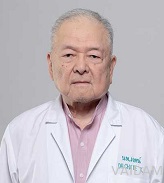Listing approximate price of Retinal Detachment Treatment and some related procedures. The prices may change depending upon the centers and condition of the patient.
| Treatment name | Cost range |
|---|---|
| Retinal Detachment Surgery | USD 3600 to USD 4400 |
Before getting retinal detachment surgery, your doctor will conduct a retinal examination to investigate the back of your eye, including the retina. He will also do an ultrasound imaging to check if any bleeding has occurred in the eye. The package typically includes the cost of the tests and you won’t have to pay anything extra.
Topical drugs used after the surgery include prednisolone acetate and difluprednate and they should be used three to four times a day for two weeks. The medicine cost is generally included in the package when the patient is in the hospital. On the other hand, if the patient buys medicines outside the hospital, they are not included in the package.
Retinal detachment surgery is an outpatient procedure and there is no need to stay in the hospital overnight. The patient has to rest for two to six months after the procedure as the vision may be blurry.
For patients planning to travel abroad it is useful to know the price in destinations popular with medical travellers. The price for Retinal Detachment in different countries is approximately:
Listing popular specialists:

Consultant, 10 years of experience

Cornea Uveitis Retina Posterior Segment Imaging

Consultant, 13 years of experience

Cataract surgery Botulinum toxin injection for hemifacial spasm and blepharospasm Optic neuropathy Eye movement disorder and cranial nerves palsy Ocular myasthenia gravis

Consultant, 15 years of experience

Cornea Refractive surgery Comprehensive eye-care.

Consultant, 28 years of experience

Photorefractive Keratectomy (Prk) Radial Keratotomy (Rk) Astigmatic Keratotomy (Ak) Automated Lamellar Keratoplasty (Alk) Laser Thermal Keratoplasty (Ltk) Conductive Keratoplasty (Ck) Intracorneal Ring (Intacs) Strabismus Cornea transplant/phototherapeutic keratectomy/pterygium surgeries Blepharitis Ocular pemphigoid Limbal stem cell deficiency Trichiasis Diabetic retinopathy Atopic conjunctivitis

Consultant, 38 years of experience

Ptosis Entropion Retina Orbit and oculoplastic oncology Facial Dystonias Congenital Lid Anomalies

Consultant, 21 years of experience

Congenital anomalies Injuries to the eyelids Tear ducts and the orbit surgeries Entropion Ectropion Ptosis Blepharoplasty Removal of eyelid tumours Canthal resection Canthoplasty, Canthoplasty Tarsorrhaphy Canthectomy Dacryocystorhinostomy Eye removal.

Consultant, 47 years of experience

Refractive surgeries Cataract LASIK and Excimer LASER

Consultant, 20 years of experience

Glaucoma

Consultant, 21 years of experience

Cornea transplant Photorefractive Keratectomy Radial Keratotomy Astigmatic Keratotomy Automated Lamellar Keratoplasty Laser Thermal Keratoplasty Conductive Keratoplasty Intracorneal Ring Strabismus Cornea transplant/phototherapeutic keratectomy/pterygium surgeries Blepharitis Ocular pemphigoid Limbal stem cell deficiency Trichiasis Diabetic retinopathy Atopic conjunctivitis

Consultant, 10 years of experience

Blepharoplasty Cataract surgery Lacrimal system cancer surgery Eye removal Anophthalmic socket surgery Eyelid retraction surgery Cosmetic eyelid surgeries Blurred vision Red eyes Eye pain Facial rejuvenation Orbital decompression Sunken eyelid repair Dry/tearing eyes Canalicular laceration repair

Consultant, 20 years of experience

Vitreoretinal Diseases and Surgery

Head of Department, 23 years of experience

Dry Eye Disease, Meibomian Gland Dysfunction

Director, 24 years of experience

Cornea and Refractive Surgery

Consultant, 21 years of experience

Cornea & Refractive Surgery
Our Services for Retinal Detachment Treatment in Thailand
Transparent - Professional - Without Hassles
The most common cause of retinal detachment happens when there's a small tear in your retina. Eye fluid called vitreous can travel through the tear and collect behind the retina. It then pushes the retina away, detaching it from the back of your eye.
A detached retina is a serious problem because it can cause blurred vision and sometimes blindness if not treated on time.
You may be told not to eat or drink anything after midnight on the day of your surgery. Your provider will tell you what medicines to take or not take on the day of your surgery.
No, the surgery is not painful because it is done under anesthesia.
A vitrectomy is a procedure done to repair serious retinal detachments. It requires removing the vitreous gel inside the eye. The vitrectomy may release the tension on the retina, allowing it to move back into its proper position where it can be reattached.
Yes, you may need surgery immediately if you have got a detached retina. In case of retinal detachment surgery there is presence of a small tear or hole in retina it can retina to lift just like wallpaper falling from a wall.
In retinal detachment surgery your doctor will put a flexible wand around the white portion of your eyes known as sclera and the band gently pushes gently on the sides of your eyes and moves them inward towards your retina which helps in reattaching the retina.
If a large part of your retina is being detached from your eyes, then you need to undergo surgery to move your retina back to its place. The treatment for retinal detachment works mainly if the detached retina is seen early.
Retinal detachment surgery is an eye condition which is seen when your retina, which is a layer of tissue seen at the back of your eye processes light and pulls away from the tissues near it. As your retina doesn’t work properly you can notice permanent loss of vision if you don’t treat it.
Some of the symptoms of detached retina are flashes of light, new floaters and presence of darkness over your vision.
In retinal detachment surgery your doctor will give you an eye drop to widen your pupil and they will use a special tool to check whether your retina is detached or not.
Generally, the surgery lasts between 45 minutes to two hours.
Retinal surgery is usually painless and performed while you remain awake and comfortable. Before the procedure begins, you will be given anesthetic eye drops that numb the eyes.
No, the surgeon will not remove your eye to do the surgery. He will use tiny microsurgical instruments and place them through the white part of the eye.
Pars plana vitrectomy is the most common surgery performed for a retinal detachment.
Retinal detachment surgery is safe if done properly. Otherwise, it can provide permanent damage to your vision.
Retinal detachment usually takes 10-20 minutes to be done and surgical attachment of retina takes about one and half to two hours.
In retinal detachment surgery, local or general anaesthesia is being used. A gas bubble is being injected into the cavity of your eye, then pressure will force retina back to its position.
In retinal detachment surgery, surgeon will put a numbing medicine in your eye. Then a tiny needle is being inserted into your eye to remove a small amount of fluid and then a small amount of air is being injected into your eye. At last laser treatment is used for repairing any holes or tears in your eyes.
This will vary depending on how you feel. This time usually lasts one to three hours, depending on the duration of the surgery.
You may have some pain in your eye, and your vision may be blurry for a few days after the surgery. Your eye may be swollen, red, or tender for several weeks.
After 24 hours of the surgery, you can take a shower. Keep your head in a special position, face down, try to maintain this as much as possible while you are showering. Do not scrub your head vigorously. Avoid getting soap and water in your eye.
You may want to use a washcloth to wash your face gently. Wear sunglasses during the day. You may have to wear an eye patch or shield for a few days.
You should sleep on either side or even your front, but not sleep on your back as that would make the bubble move away from the macular hole.
If you get to know about a hole or tear in your retina but your retina has not started to detach then there is an option of laser surgery, in laser surgery surgeon points a laser beam into your eyes so that tiny burns are being created around the hole. It will cause tear to prevent from developing into a retina detachment.
It will need few weeks to check how good or bad your vision is after surgery. The best result is seen if the repair is done just before the center part of retina known as macula detaches. There are chances that in some cases you can loose your sight. If you notice any sudden changes in your vision or if you start seeing some dots appearing before your eyes or some flashes then you should immediately contact your doctor.
Retinal detachment surgery involves some of the risks such as infection, bleeding, higher pressure inside your eyes and presence of fogging of the lens in your eyes.
You should visit your doctor immediately if you see any flashes of light or any other changes in your vision. If you are having diabetes or high blood pressure then keep them in control because these will help in keeping the blood vessels in your retina healthy.






NABH Certified Healthcare Discovery Platform
Vaidam is NABH certified healthcare discovery platform that will connect you to top-notch medical experts, hospitals, wellness options, and trusted travel partners to help identify and make the right healthcare choices.

Researched & Personalized Treatment Plan - Under One Roof
You can search for the best hospitals, read about them, view photographs of the facilities at the hospitals and the places at which the hospitals are located, and check the cost of treatment.

Quality Treatment Within Your Budget
As soon as you post an enquiry, the patient relation team will collect details from you, share them with the doctors and hospitals on Vaidam's panel, and get a personalized treatment plan. We research to get quality treatment within your budget.

Treatment to Travel
Vaidam concierge assists patients, to get medical Visa, the best airline fares and arrangements for your stay. Our concierge also helps you with daily travel, language, and food concerns. Vaidam does everything to be your perfect host. All of Vaidam’s services are free of cost to patients.

International Reach
Vaidam Health has network in 15+ countries, which includes India, Turkey, UAE, Germany, South Korea, Thailand, Malaysia, Spain.
Note: Vaidam Health does not provide medical advice, diagnosis or treatment. The services and information offered on www.vaidam.com are intended solely for informational purposes and cannot replace the professional consultation or treatment by a physician. Vaidam Health discourages copying, cloning of its webpages and its content and it will follow the legal procedures to protect its intellectual property